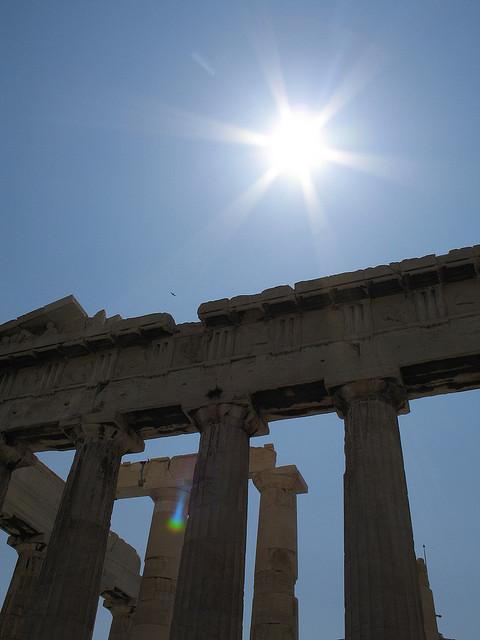Greek Tourism in 108 Degrees
The Acropolis, Athens, Greece. (Photo: Flickr)
Did you think it was hot where you were Monday?
Spare a thought for the poor people in Athens, Greece.
As if they didn’t already have a lot to worry about. Monday residents of the Greek capital had to contend with temperatures in the neighborhood of 108 degrees Fahrenheit.
Extreme heat waves aside, though, sunny warm weather should be good news for a country where one in five people make their living – directly or indirectly – from tourism.
“When tourism goes okay, then the economy goes okay. If tourism goes, then the whole economy goes bad,” says George Drakopolous, director general of a non-profit group that lobbies on behalf of Greek tourism operators.
I sat down with Drakopolous the last time I was in Athens on a reporting trip just after last month’s elections. He told me that the negative press about Greece’s financial crisis was definitely keeping some Western European tourists away.
Germans, in particular.
In fact, Drakopolous told me at the time that bookings from Germany to Greece were down more than 20 percent.
And that, he told me, spells trouble.
“Less people traveling, less people visiting the country…less people to serve them. So we risk a drop in the employment levels,” he says.
Drakopolous also says many parts of the country are seeing a marked drop in internal tourism. In other words, Greeks themselves aren’t traveling, or if they are – aren’t spending much money.
Interestingly though, all is not lost for the Greek tourism industry thanks to a little help from the Russians.
“We experienced an increase in the Russian market by 63 percent. 6-3. And we are pretty confident that we’re going to pass the limit of 1 million Russians in Greece this year,” he says.
And, Drakopolous told me, each of those Russians spends on average about $400 dollars than a German. He said his group is lobbying the new Greek government to ease tourist visa restrictions for those coming from the east.
And not just Russians.
China, and India, he said, both represent major markets for Greece. But, Drakopolous says, the real trick is getting would-be tourists to ignore all the bad news they’re hearing about the situation in Greece.
“The weather is nice,” Drakopolous says. “The climate is nice. The people are the same. The beaches are the same. The Acropolis is the same. The prices are slightly cheaper than in other years. So, the real tourist stuff hasn’t been affected. But tourism isn’t an independent thing. It’s a part of life. And in real life, you need stability, you need safety while traveling, you don’t need any hassle. I mean, the only problem a tourist must have is where shall I go for lunch? Where shall I go for dinner? Which beach will I go to today? Which museum shall I visit? This will be the daily rhythm of the tourist, not oh the center will be closed, and blah blah blah. So, it’s the most important thing, to stabilize the whole situation here.”
Since the Greek elections and the formation of a government, international focus on the euro crisis has shifted more towards Spain. And that seems to be good news for Greek tourism.
Monday, an Athens newspaper reported that German tour bookings are creeping up again.
But it might be too late.
“I’m afraid we don’t have enough time to cover the loss for this year,” Drakopolous says. “So Germany – the market will end up at a loss for the year. But still, minimizing the loss is better than maximizing the loss.”
And then there’s that extreme weather we mentioned earlier. It was so hot in Athens Monday that the Acropolis…a must-see for tourists… was shut down in mid-afternoon.
As one Athenian said on Twitter – apparently it’s so hot that even marble will melt.
I’m not sure, though, that’s going to work as a marketing slogan.
